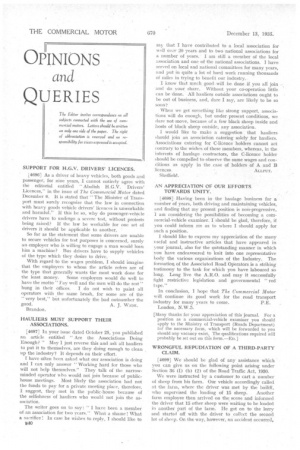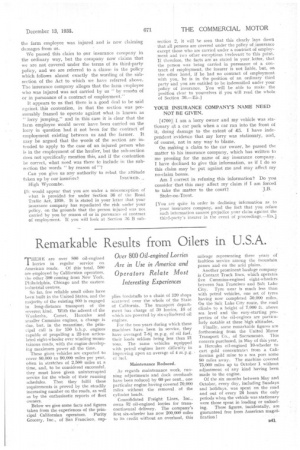OPINIONS
Page 58

Page 59

If you've noticed an error in this article please click here to report it so we can fix it.
and
QUERIES
The Editor invites correspondence on all subjects connected with the we of cornrnercial motors. Letters should be written on only one side of the paper. The right of abbreviation is reserved and no responsibility for views expressed is accepted.
SUPPORT FOR H.G.V. DRIVERS' LICENCES.
[4696] As a driver of heavy vehicles, both goods and passenger, for nine years, I cannot entirely agree with the editorial entitled " Abolish H.G.V. Drivers' Licences," in the issue of The Commercial Motor dated December 6. It is stated that -" The Minister of Transport must surely recognize that the law in connection with heavy goods vehicle drivers' licences is unworkable and harmful." If this be so, why do passenger-vehicle drivers have to undergo a severe test, without protests being raised? If the law be workable for one set of drivers it should be applicable to another.
So far as the statement that some drivers are unable to secure vehicles for test purposes is concerned, surely an employer who is willing to engage a man would loan him a machine? Bus drivers have to supply vehicles of the typo which they desire to drive.
With regard to the wages problem, I should imagine that the employers to whom the article refers are of the type that generally wants the most work done for the least money. Some employers would do well to have the motto " Pay well and the men will do the rest"
hung in their offices. I do not wish to paint all operators with the same brush, for some are of the " very best," but unfortunately the bad outnumber the
good. A. J. WADE. Brandon.
HAULIERS MUST SUPPORT THEIR . ASSOCIATIONS.
[4697] In your issue dated October 25, you published an article entitled " Are the Associations Doing Enough?" May I just reverse this and ask all hauliers to put it to themselves, are they doing enough to clean up the industry? It depends on their effort.
I have often been asked what our association is doing and I can only answer "Working hard for those who will not help themselves." They talk of the narrowminded operator NN ho would not join because of publichouse meetings. Most likely the association had not the funds to pay for a private meeting place, therefore, I. suggest, they met in the public-house because of the selfishness of hauliers who would not join the association.
The writer goes on to say: " I have been a member of an association for two years." What a shame What a sacrifice ! In case he wishes to reply, I should like to say that I have contributed to a local association for well over 20 years and to two national associations for a number of years. I am still a member of the local association and one of the national associations. I have served on local and national committees for many years, and put in quite a lot of hard work running thousands of miles in trying to benefit our industry..
I know that much good will be. done if you all join and do your share. Without your co-operation little can be done. All hauliers outside associations ought to be out of business, and, dare I say, are likely to be so soon?
When we get something like strong support, associations will do enough, but under present conditions, we dare not move, because of a few black sheep inside and hosts of black sheep outside, any association.
I would like to make a suggestion that hauliers should join an association catering solely for hauliers. Associations catering for C-licence holders cannot act contrary to the wishes of these members, whereas, in the interests of haulage contractors, the C-licence holder should be compelled to observe the same wages and conditions as apply in the case of holders of A and B licences, ALLPUT. Sheffield.
AN APPRECIATION OF OUR EFFORTS TOWARDS UNITY.
[4698] Having been in the haulage business for a number of years, both driving and maintaining vehicles, nd finding that my present position is non-progressive, I am considering the possibilities of becoming a commercial-vehicle examiner. I should be glad, therefore, if you could inform me as to where I should apply for such a position.
I should like to express my appreciation of the many useful and instructive articles that have appeared in your journal,, also for the outstanding manner in which you have endeavoured to knit into one representative body the various organizations of the Industry., The formation of the Associated Road Operators is a striking testimony to the task for which you have laboured so long. Long live the A.R.O. and may it successfully fight restrictive legislation and governmental "red tape."
In conclusion, I hope that The commercial Motor will continue its good work for the road transport
industry for many years to come. P.E. London, N.W.5.
[Many thanks for your appreciation of this journal. For a position as a commercial-vehicle examiner you should apply to the Ministry of Transport (Roads Department) for' the necessary form, which will be forwarded to you should any vacancy exist. The qualifications required will probably be set out on this form.—En.] WRONGFUL REPUDIATION OF A THIRD-PARTY CLAIM.
[4699] We should be glad of any assistance which you can give us on the following point arising under Section 3fi (I) (b) (2) of the Road Traffic Act, 1930.
We were instructed by a customer to cart a number of sheep from his farm. Our vehicle accordingly called at the farm, where the driver was met by the bailiff,
who supervised the loading of 15 sheep. Another farm employee then arrived on the scene and informed the driver that 15 other sheep were waiting to be loaded ill another part of the farm. He got on to the lorry and started off with the driver to collect the second lot of sheep. On the way, however, an accident occurred,
the farm employee was injured and is now claiming damages from us.
We passed this claim to our insurance company in the ordinary way, but the company now claims that we are not covered under the terms of its third-party policy, and we are referred to a clause in the policy which follows almost exactly the wording of the subsection of the Act to which we have referred above. The insurance company alleges that the farm employee who was injured was not carried by us "by reason of or in pursuance of a contract of employment."
It appears to us that there is a good deal to be said against, this contention, in that the section was presumably framed to operate against what is known as " lorry jumping," and in this case it is clear that the farm employee would never have been carried on the lorry in question had it not been for the contract of employment existing between us and the farmer. It may be argued that the words of the section are intended to apply to the case of an injured person who is in the employment of the haulier, but the sub-section does not specifically mention this, and if the contention be correct, what need was there to include in the subsection the words " by reason of 0?
Can you give us any authority to rebut the attitude taken up by our insufers? INSURED. High Wycombe.
[It would appear that you are under a misconception of what is provided for under Section 36 of the Road Traffic Act, 1930. It is stated in your letter that your insurance company has repudiated the risk under your policy, on the grounds that the person injured was nor carried by you by reason of or in pursuance of contract of employment. /1 you will look at Section 86 B subs section 2, it will be seen that this clearly lays down that all persons are covered under the policy of ,insurance except those who are carried under a contract of employment and two other exceptions irrelevant to this point. If therefore, the facts are as stated in your. letter, that the person was being carried in pursuance of a contract of employment, the insurer is not liable, but, on the other hand, if he had no contract of employment with you, 'he is in the position of an ordinary third party and you are entitled to be indemnified under your policy of insurance. You will be able to Make the position clear to yourselves if you will read the whole of Section 36.—ED.] YOUR INSURANCE COMPANY'S NAME NEED NOT BE GIVEN.
[4700], I am a lorry owner and my vehicle was stationary at a car park when a car ran into the front of it, doing damage to the extent of £5.. I have independent evidence that my lorry was stationary, and, of course, not in any way to blame.
On making a claim to the car owner, he passed the matter to his insurance company, which has written to me pressing for the name of my insurance company. I have declined to give this information, as if I do so this claim may be put against me and may affect _thy no-claim bonus.
Am I correct in refusing this information? Do you consider that this may affect my claim if I am forced
to take the matter to the court? J.B. Stoke-on-Trent.
[You are quite in order in declining information as to your insurance company, and the fact that you refuse such information cannot prejudice your claim against the third-party's insurer in the event of proceedings.—En.]




































































































